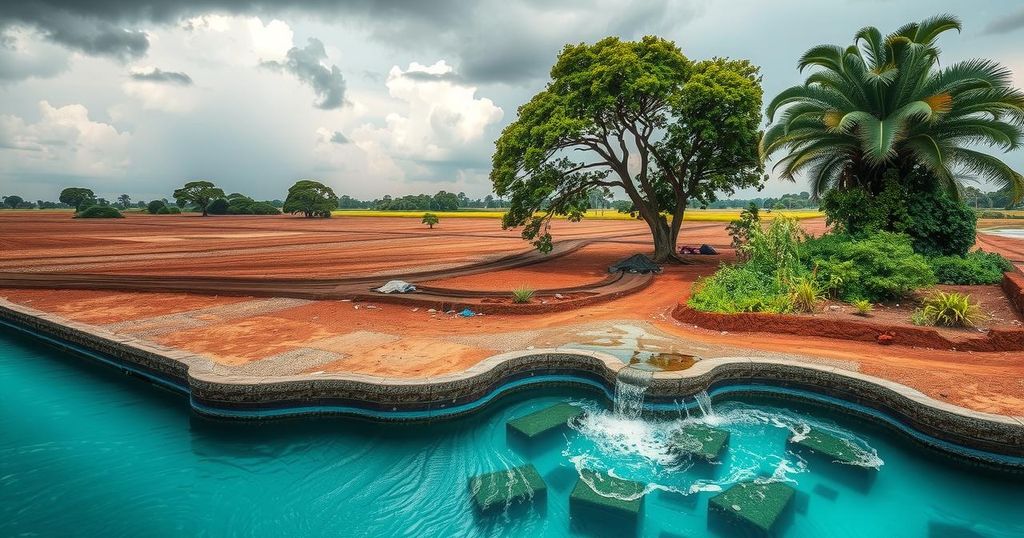World news
AFRICA, CHI, CHIDO, CLIMATE, CLIMATE CHANGE, CLIMATE CHANGE AND METEOROLOGICAL SERVICES, FRENCH INDIAN OCEAN, GLOBAL WARMING, GUY TAYLOR, INAM, LUCY MTILATILA, MALAWI, MOZAMBIQUE, NATIONAL INSTITUTE OF METEOROLOGY, NATURAL DISASTERS, PARIS AGREEMENT, PEMBA, UNICEF, ZIMBABWE
Jamal Robinson
0 Comments
Cyclone Chido Strikes: Mozambique and Malawi Face Increasing Climate Challenges
Cyclone Chido has devastated northern Mozambique, displacing thousands and causing serious damage. This recent disaster adds to the growing frequency of cyclones in the region, attributed to climate change. Key concerns include impacts on food security and healthcare access. UNICEF and other organizations are actively involved in relief efforts, emphasizing the need for long-term planning and international support to build resilience against future weather-related disasters.
The recent Cyclone Chido has severely affected northern Mozambique, particularly the Cabo Delgado and Nampula provinces, after making landfall on December 15, 2024. This cyclone follows a series of devastating storms in southern Africa, exacerbating the ongoing challenges posed by climate change, which has led to more frequent and intense cyclonic activities in the region. With winds reaching 260 km/h (160 mph) and extraordinary rainfall, Cyclone Chido has displaced thousands and caused significant damage to infrastructure, homes, and vital services.
Lucy Mtilatila, Director of Climate Change and Meteorological Services in Malawi, articulated the compounding effects of global warming, stating that, “Right now, we are seeing that indeed climate change is affecting us. We used to have tropical cyclones affecting Malawi, but it was maybe once in 10 years. But right now, you can see the frequency.” The immediate effect has been widespread devastation, including the reported fatalities and severe infrastructure damage, with emergency responders mobilizing to assist those who have been displaced.
The fallout from Cyclone Chido raises pressing concerns about the long-term impacts on food security, health care access, and education. UNICEF’s Guy Taylor highlighted, “But we’re also worried about the longer-term impacts: children potentially being cut off from learning for weeks, people unable to access healthcare, and the spread of waterborne diseases like cholera and malaria.” Despite these challenges, preparations prior to the cyclone have led to better coordination among various sectors in Malawi, offering a glimmer of hope for effective disaster response.
Authorities continue to assess the extent of the damage while also preparing for the long-term implications of food shortages and health crises precipitated by such severe weather events. Luisa Meque from Mozambique’s National Institute for Risk and Disaster Management emphasized the ongoing need for vigilance and adaptive strategies to mitigate further vulnerabilities as the region copes with successive cyclonic episodes. This persistent pattern of climate disruption calls for enhanced international aid to bolster resilience and address the critical drivers of climate change.
In conclusion, as Mozambique and Malawi grapple with the repercussions of Cyclone Chido, the focus must shift toward not only immediate relief efforts but also sustainable planning and infrastructure development to withstand future climate-related adversities. The lessons learned from these catastrophic events could pave the way for better preparedness amid increasing climate variability and its associated risks.
Southern Africa is currently facing a heightened risk of cyclones due to the influence of climate change, which has led to rising temperatures in ocean waters, particularly the Indian Ocean. This creates an environment conducive to the development of cyclones, with Mozambique and Malawi being among the most affected nations. The frequency and severity of storms, such as Cyclone Chido, highlight a broader trend of extreme weather events that are increasingly impacting the region’s populace and infrastructure. Historically, cyclones like Idai, Freddy, and Ana have wreaked havoc in the region, leading to widespread displacement, loss of life, and significant economic challenges. As communities strive to rebuild, the directives for improved disaster preparedness have become more critical than ever, with calls for international assistance to enhance resilience efforts in combating the effects of climate change.
The impact of Cyclone Chido underscores the urgent need for robust disaster preparedness and adaptive strategies in Mozambique and Malawi. As climate change continues to drive the frequency and intensity of storms, it is imperative for local authorities and humanitarian organizations to collaborate on immediate response strategies while also planning for long-term resilience. Enhanced international support is crucial for building resilient infrastructure and addressing the underlying causes of climate vulnerabilities, ensuring the communities in these nations can withstand future climatic challenges effectively.
Original Source: www.dw.com




Post Comment